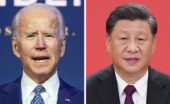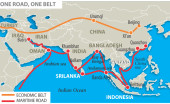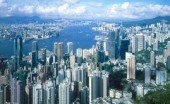Re Ian Bremmer 'Could third-party candidates upend the 2024 US election?' 3 April The current political movement in the USA…
China – Hong Kong January 2024 –
Written by Diana Thebaud Nicholson // March 20, 2024 // China // Comments Off on China – Hong Kong January 2024 –
Dennis Kwok on the end of democracy in Hong Kong
June 2020
19-20 March
Tighter security laws may sap yet more foreign investment from Hong Kong
Helen Davidson
Latest legislative crackdown on dissent and international collaboration likely to scare off some businesses, say critics
(The Guardian) Thomas Kellogg, a law professor at Georgetown University, told Bloomberg last month that the provisions on foreign contact could limit the activity of chambers of commerce and economic research groups. “The free flow of information is the lifeblood of any vibrant market economy,” Kellogg said.
Some business groups had expressed particular concern about broad definitions in the new law, particularly around definitions of state secrets and espionage.
Another legal academic, who was formerly based in Hong Kong and requested anonymity, said: “Multinationals in general will now think twice about basing themselves in Hong Kong or moving senior people to Hong Kong, simply because article 23 can be used quite liberally to frame people on the grounds of espionage or theft of state secrets.”
Ian Bremmer: Hong Kong’s new security law ends remaining political independence
… Takes away small remaining vestiges of political independence, none of which people expected were going to be maintained for long. … Hong Kong is no longer a bridge into mainland China. It is now a component of a greater Chinese economy. And to the extent that economy starts turning around and doing better, Hong Kong will do well. It’s not right now, so it’s not performing quite as effectively. And, you know, a lot of the expats have already gotten out of Dodge.
What’s the scope of Hong Kong’s new national security laws?
(Reuters) – Hong Kong on Tuesday passed its new national security law, a bill that broadens the definition of crimes including sabotage, sedition and state secrets, and stipulates tougher penalties of up to life imprisonment.
The law could have implications for many sectors in the global financial hub including business, academia, law, diplomacy and the media, observers say.
The new offences span a number of areas ranging from grave acts affecting sovereignty including insurrection – or initiating armed conflict against a Chinese armed force – to everyday offences including possession of publications deemed seditious. Authorities say the law will apply beyond Hong Kong.
Article 23: Hong Kong passes tough security law fought by protesters for years
(BBC) Hong Kong has passed a tough security law which authorities say is necessary for stability, but which critics fear will further erode civil liberties.
Article 23 targets new offences like external interference and insurrection, and penalties include life sentences.
Article 23 expands on a controversial national security law (NSL) earlier imposed by China.
… But Hong Kong’s leader John Lee has said Article 23 is also necessary to guard against “potential sabotage and undercurrents that try to create troubles”, particularly “ideas of an independent Hong Kong”. He hailed its passing as “a historic moment Hong Kong people have been waiting for over 26 years”.
China’s Vice-Premier Ding Xuexiang earlier said swift enactment of the new legislation would protect “core national interests” and allow Hong Kong to focus on economic development.
Hong Kong passes tough new national security law
Hong Kong has passed a new national security law that critics fear will further erode civil liberties in the China-ruled city.
21 February
Even China’s Giants Are Picking Singapore Over Hong Kong for HQs
(BNN/Bloomberg) The international business community is clear on where it wants to call home in Asia: Singapore.
… Even many Chinese companies seeking to hedge geopolitical risks and broaden their reach pick Singapore over Hong Kong, the report found.
“Hong Kong has lost the race to be international business’ preferred choice for Asia headquarters, as more global and even Chinese companies choose Singapore because of its better relations with the West, broader talent pool, diversified economy, and tax incentives,” according to the 50-page report.
Hong Kong codified its position as China’s finance center by containing political protests and adhering to the country’s Covid-Zero policy during the pandemic, while Singapore highlighted its independence and emerged as the preferred site for international business offices, the report said. Even Hong Kong’s lower standard corporate tax rate of 16.5% may be bested by Singapore programs that can cut its 17% tax rate to 13.5% or less for some activities, it found.
30 January
Evergrande collapse means foreign investors in China face even greater uncertainty
Thousands of homebuyers who have paid deposits for homes in China could find their nest eggs at risk after liquidation order
As China’s most embattled – and indebted – property developer is ordered to liquidate, the effects that Evergrande’s collapse will have on investors, debt holders and the hundreds of thousands of homebuyers who have paid deposits for homes remains uncertain.
Evergrande, the Chinese property developer, was worth just $275m on Monday, down 99% from its peak in 2017. It owes more than $300bn to various creditors, according to its most recent financial report.
In a scathing judgment delivered in Hong Kong’s high court on Monday, Justice Linda Chan said “enough is enough”.
23 January
Jimmy Lai: UN experts call for release of Hong Kong newspaper founder
Statement from UN special rapporteurs said they were ‘alarmed’ by violations of Lai’s freedom of expression
Four UN experts have called for all charges against pro-democracy Hong Kong tycoon Jimmy Lai to be dropped, as they pressed for his immediate release.
“Jimmy Lai’s arrest, detention and series of criminal proceedings over the past few years appear to be directly related to his criticism of the Chinese government and his support for democracy in Hong Kong,” the UN experts said.
The statement was penned by the special rapporteurs on freedom of expression, on freedom of association, on degrading treatment or punishment and on the independence of judges and lawyers.
2 January
Jimmy Lai pleads not guilty to all charges at Hong Kong national security trial
Media tycoon and pro-democracy activist is accused of conspiring to commit foreign collusion and publish seditious material



